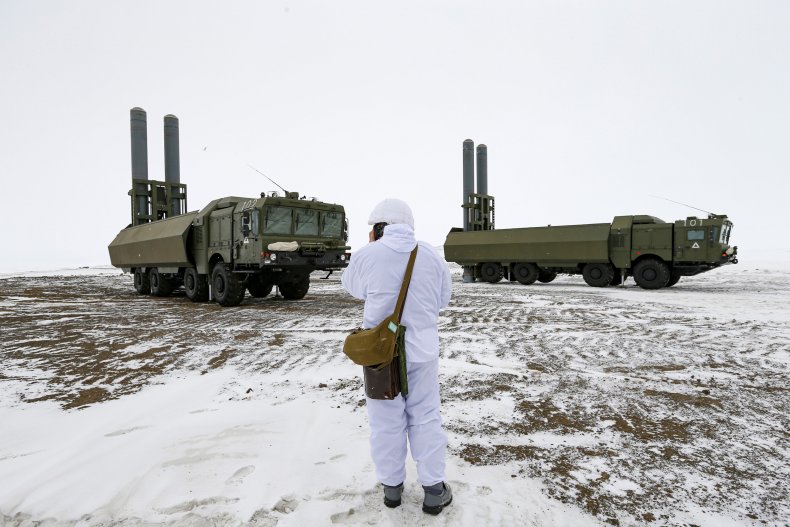Russia's Foreign Minister Shrugs Off Concerns of Military's Arctic Expansion: 'It's Our Territory'
Russia's foreign minister rebuffed Western concerns that the nation is asserting its military influence over wide areas of the Arctic, stating Monday that the region is Russia's "territory."
"We hear whining about Russia expanding its military activities in the Arctic," Foreign Minister Sergey Lavrov said, according to the Associated Press. "But everyone knows that it's our territory, our land. We bear responsibility for the Arctic coast to be safe, and everything our country does there is fully legitimate."
Lavrov's comments come as Russia seeks to expand activity in the Arctic, and across Nagurskoye, its northernmost military base. The Nagurskoye base currently houses missiles and radar activity, and can handle all types of aircraft, including nuclear-capable strategic bombers, according to AP.
Russia has also declared its intention to set navigation rules, and introduce foreign ships and pilots along the Northern Sea Route, a stretch of Arctic sea shelf that runs from Norway to Alaska. In response, the U.S. and NATO have accused Russia of "exploiting" territories and attempting to exercise too much control in the region.
For more reporting from the Associated Press, see below.

Russia has sought to assert its influence over wide areas of the Arctic in competition with the United States, Canada, Denmark and Norway as shrinking polar ice from the warming planet offers new opportunities for resources and shipping routes. China also has shown an increasing interest in the region, believed to hold up to one-fourth of the Earth's undiscovered oil and gas.
Russian President Vladimir Putin has cited estimates that put the value of Arctic mineral riches at $30 trillion.
Tensions between Russia and the West will likely loom large over Thursday's meeting of the Arctic nations' foreign ministers in Reykjavik, Iceland, where Moscow is set to take a rotating chairmanship in the Arctic Council.
Admiral Alexander Moiseyev, chief of Russia's Northern Fleet, said last week that Moscow has the right to set navigation rules along the shipping lane.
"Practically the entire Northern Sea Route goes through Russia's territorial waters or the country's economic zone," Moiseyev told reporters aboard the Peter the Great missile cruiser. "The complex ice conditions make it necessary to organize safe shipping, so Russia insists on a special regime of its use."
NATO is increasingly worried about the growing Russian military footprint in the Arctic, and Washington sent B-1 bombers to Norway this year.
"Increased Russian presence, more Russian bases in the High North, has also triggered the need for more NATO presence, and we have increased our presence there with more naval capabilities, presence in the air, and not least, the importance of protecting transatlantic undersea cables transmitting a lot of data," NATO Secretary-General Jens Stoltenberg said.
Moiseyev fretted about the U.S. military assets in Norway, saying it has led to an "increase of the conflict potential in the Arctic."
The Russian Foreign Ministry last week fumed at a U.S. nuclear submarine calling at a Norwegian port, saying it reflected what it described as "Oslo's course for the militarization of the Arctic."
On the sidelines of this week's Arctic Council meeting, Lavrov is set to hold talks with U.S. Secretary of State Antony Blinken—an encounter intended to lay the groundwork for Putin's meeting with U.S. President Joe Biden planned for next month.
Blinken has pointed out that with the Arctic warming at twice the rate of the rest of the global average, Russia has moved to increase its presence in the region.
"Russia is exploiting this change to try to exert control over new spaces," he said last month. "It is modernizing its bases in the Arctic and building new ones."
In March, the Russian military conducted drills at Nagurskoye with ground troops and a pair of MiG-31 fighters flying over the North Pole. The exercise also saw three nuclear submarines smash through the Arctic ice next to one another in a carefully planned show of force.


